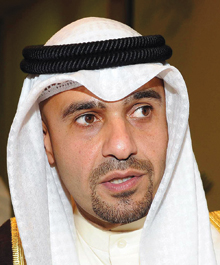 Anas Al-Saleh
Anas Al-SalehKUWAIT: Kuwait is taking steps to sell minority stakes in units of the state oil producer as the government plans to tap global capital markets for funds and improve efficiency in its most important industry. The government has a four-year plan to organize and execute sales of shares in the international units and the shipping and chemical arms of Kuwait Petroleum Corp, Finance Minister Anas Al-Saleh, also acting oil minister, said in a phone interview with Bloomberg. KPC, responsible for the country's 3 million barrels of daily crude output, won't be part of the sale, he said.
Middle Eastern oil producers are seeking to diversify their economies and develop new sources of revenue after a supply glut triggered a plunge in crude to a fraction of its 2014 average of close to $100 a barrel. Saudi Arabia, the biggest producer in OPEC, plans to sell as much as 5 percent of the kingdom's state producer Saudi Arabian Oil Co. by 2018. Like Saudi Arabia, neighboring Kuwait is planning an economic overhaul that would involve cutting subsidies and selling some state assets.
"We are looking into privatization," Saleh said. Kuwait is planning "definitely soon" to sell stakes of 20 percent to 30 percent in the oil units, he said. The government, which would keep majority control of the energy companies once it listed their shares, is preparing for the initial public offerings even as it studies in greater detail which businesses to sell and when, Saleh said. He declined to specify dates for the IPOs or estimate how much money they would generate for the government, other than to say, "definitely we would not touch anything if it wasn't worthwhile''.
Kuwait Petroleum International, which owns refineries in Asia and the Q8 chain of filling stations in Europe, is among the candidates for sale. Others are Kuwait Foreign Petroleum Exploration Co, Kuwait Oil Tanker Co and Petrochemical Industries Co, said Saleh.
Kufpec, as the foreign exploration unit is known, pumps oil and natural gas in 15 countries in Asia, Africa, Europe and North America, according to its website. The company aims to reach a daily output of 200,000 barrels of oil equivalent by 2020 and maintain that level of production until 2030, it said. Kuwait Oil Tanker's fleet includes 20 vessels for transporting crude and oil products, according to its website.
In addition to the KPC subsidiaries, Kuwait may consider selling shares in domestic power companies, the postal service, a phone company and local bus operators, Saleh said. He said in an interview in May that the country planned also to issue international bonds and has started borrowing locally to cover the budget shortfall caused by lower oil prices. Kuwait ranks along with the United Arab Emirates as the fourth-largest producer in the Organization of Petroleum Exporting Countries, data compiled by Bloomberg show.
Kuwait is also open to liaising with Saudi Arabia on its planned debt sale as the two nations prepare to test investor appetite for about $20 billion of bonds. "If it's required and if our advisers think we should coordinate in terms of timing we would do that,'' Saleh said, referring to the country's plan to raise as much as $9.9 billion in September. "We have very strong ties.''
The plunge in crude is driving bond sales across the six-nation Gulf bloc as governments seek to plug budget deficits that the International Monetary Fund says could reach $900 billion by 2021. After Qatar raised a record $9 billion in May and Abu Dhabi $5 billion in April, Saudi Arabia and Kuwait are the next to test investor appetite for Middle Eastern debt after the summer, with Saudi Arabia said to be also seeking at least $10 billion.
"They are competing with each other and even if there is some coordination, at the end of the day each government is trying to raise as much money as possible while interest rates are low,'' said Talal Touqan, head of research at Abu Dhabi-based Al Ramz Capital LLC, a brokerage and investment bank. The surge in issuance comes as "the whole world is suffering from liquidity constraints.''
Kuwait is aiming to start the international bond sales in September and has still to hire banks to manage the offering, Saleh said. Saudi Arabia has appointed JPMorgan Chase & Co, HSBC Holdings Plc and Citigroup Inc. to arrange its first international bond sale, people with knowledge of the matter said last month, with the timing of the sale likely after the summer, they said. Only half way into this year and Gulf issuers have already raised $36.25 billion in conventional and Islamic bonds. That compares with about $26 billion raised in all of 2015 and the $33.5 billion sold in 2014, data compiled by Bloomberg shows.
The minister said in May that the country had hired consulting firm Oliver Wyman & Co to set up a debt management office. A special committee with officials from the finance ministry, sovereign wealth fund and central bank will decide on whether to offer Islamic or conventional debt and whether to sell the debt in tranches. Kuwait is also planning to sell as much as KD 2 billion ($6.6 billion) domestically. "There is a huge appetite from investors'' for regional debt, Saleh said. "We have good ratings, good reserves and good economic reform plans.''
Low oil prices - which halved from around $100 per barrel in 2014 - have pummeled the finances of oil-rich nations, prompting reform programs intended to save cash and restructure the economy. Saleh is seeking to cut wasteful spending, reducing utility subsidies, introducing corporate taxes and increasing fees, in common with a similar reform program in Saudi Arabia. - Bloomberg










